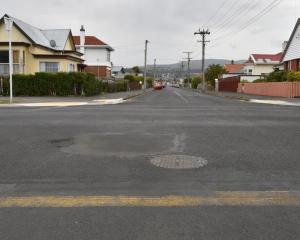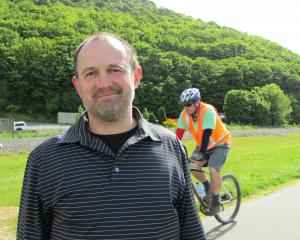The flood of submissions on the proposal to install separate cycle lanes on part of State Highway 1 through central Dunedin, a large number of which are in favour of the plans, underlines strong feelings on cycling in the city.
Such is the passion that provision for cycling is becoming the biggest and most divisive issue since the stadium debates.
Both sides, on the whole, have little empathy or understanding of where the other is coming from. Each is adamant right is on their side. Each is convinced they have majority support and inexorable logic backs their stance.
The death of cyclists, especially that of Dr Chris He when a car door opened in front of him outside the hospital and he was run over by a truck, give cycling advocates - understandably - moral high ground.
It provides a strong emotional pull to efforts to separate cars and trucks from cyclists by more than just a painted line. It has given strong impetus for change, which has been picked up by the New Zealand Transport Agency (NZTA), the mayor and several councillors.
Cycling's ''green'' credentials because of ''climate change'' and carbon emissions provides more emotive heft. The provision of cycling infrastructure becomes a cause that aligns with fervent efforts to secure the future of the planet, and supporters are well-organised and motivated. As such, many who would never or seldom cycle are still enthusiastic for Dunedin to do its bit, to show it is a modern city concerned about the environment and the safety of cyclists.
Opposing this are many who, while of course wanting cycling to be safe, believe in what they would argue are the practicalities.
They believe the vast majority use cars and will do so for the foreseeable future.
City businesses rely on them, and the loss of many parks would, one businessman said, be ''utter lunacy''. And the loss of parks outside the fracture and physiotherapy clinic entrance of the hospital will cause difficulties.
The fact of the matter is the city is based around the automobile, and will be for some time yet. Wishful thinking and the spending of many millions of dollars will not change that.
Work has already begun on the first stage of a $4.5 million cycle network around South Dunedin. But will that many cyclists actually use the cycleways? Can heavily indebted Dunedin spare any significant money for such projects?
Are these plans, actually, only being pushed so enthusiastically by the council because the New Zealand Transport Agency will pay much of the costs? Will, in reality, that many more cyclists take advantage of new infrastructure when Dunedin is a hilly city without a culture of using bicycles for commuting? Is it build the network and they will come?
What has also upset those who object to many millions of dollars being spent on what they see as a small minority is the belief the plan to install the separated cycleways has been pre-determined and that consultation is effectively a sham.
NZTA project leader for the proposed separate lanes, Simon Underwood, has already made it clear several suggestions from the public will not work. Perhaps he is correct because of research undertaken before the cycle path proposal was put forward.
But certain remarks make his fundamental position clear, notably: ''There's been quite a few comments along the lines of cyclists shouldn't be here. They should be somewhere else. It's almost a bit nimby. They say 'put them on the footpath, and then it's not my problem any more'. But then it becomes the pedestrian's problem.''
It does seem the objective of a separated State Highway 1 is in sight and consultation will change, at most, very little. The parallels with the determination to built the stadium will not be lost on some residents.
It must be hoped, nonetheless, that cycling issues can be both discussed and considered relatively dispassionately so all matters and all practicalities can be taken into account.
Each side must, at the same time, recognise the sincerity of opposing views and avoid - as occurred at times over the stadium - debates that descend into personal and disparaging attacks. Everyone needs to keep to the issues involved.










